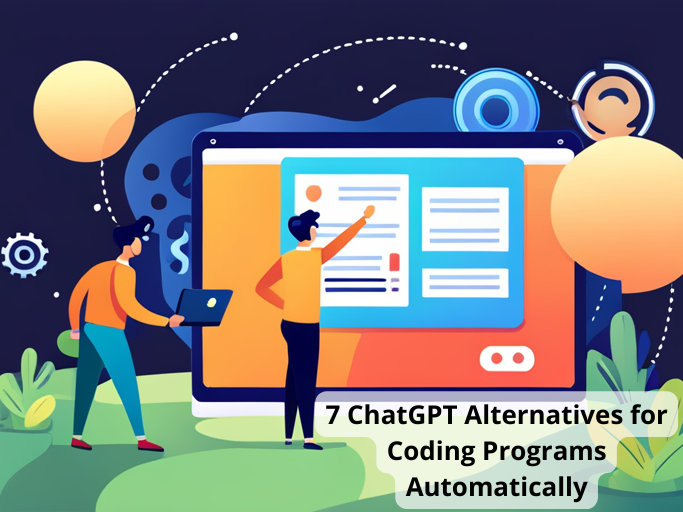ChatGPT is a great AI tool for automatically generating code from human language prompts. However, it’s not focused specifically on code and may not integrate seamlessly into your workflow. Here are several options for more code-focused AI tools.
1. GitHub Copilot

GitHub Copilot is an AI assistant developed by GitHub in collaboration with OpenAI. As you type, it suggests full lines of code for various programming languages. Copilot is trained on the public repositories available on GitHub.
Some key features of GitHub Copilot are:
It analyzes your code and suggests code snippets based on context. It can suggest variable names, functions, and entire lines of code.It can generate code based on the comments written in natural language.It supports programming languages including Python, JavaScript, TypeScript, Ruby, Go, PHP, C++, C#, Java, HTML, CSS, SQL, and Shell.It is available as an extension in Visual Studio Code (VS Code), Visual Studio, Neovim, and the JetBrains suite of IDEs.GitHub copilot is not free but has a 60-day free trial period. After that, you need to subscribe to an individual or a business plan to use it.
2.
Codeium
Codeium is a free AI-powered code generation tool that can generate code from natural language comments or previous code snippets.
Some of its key features are:It supports 40+ programming languages including C++, Go, Java, JavaScript, Rust, Python, PHP, and so on.Trained on a large dataset of public code.Integrates with popular IDEs like VS Code, JetBrains, Jupyter/Colab Notebooks, Neovim, Emacs, and VSCode Web IDEs like Gitpod.Codeium simplifies test-driven development by generating test cases for you.Codeium can search and insert API endpoints in your code based on the context or comments you write.The enterprise plan allows companies to deploy codeium on their own servers or in the cloud ensuring their code remains private.You can see how it works on the codeium playground.
3.
CodeWhisperer
CodeWhisperer is a code generation tool created by Amazon. Like Copilot and Codeium, it generates code suggestions based on context and comments. The main difference is that CodeWhisperer mainly focuses on supporting code for AWS services.
Some of its key features include:Integration with modern IDEs like Visual Studio Code through the AWS Toolkit for Visual Studio Code, JetBrains through the AWS Toolkit for Jetbrains, AWS Lambda console, and AWS Cloud9.Scanning your code to highlight and define security issues.An option to opt out of CodeWhisperer sharing your data with AWS.Trained on in-house Amazon code and open-source code.Support for Java, JavaScript, Python, C#, and TypeScript.During the preview period, CodeWhisperer is free to use.
4.
Tabnine
Tabnine is also an automatic code generation tool that works in your IDE. It generates the code based on your previous code and also based on your comments. Some of its key features are:
Support for more than 30 programming languages including JavaScript, Python, TypeScript, Rust, Go, and BashAbility to host and train your own AI model when using the pro version which ensures your code remains yours.Ability to run locally or in the cloud depending on your compliance and security needs.Unit test generation (only available in beta as of writing).Integration with major IDEs such as VS Code, Neovim, Rider, and Android Studio.Tabnine is available as a free version and a paid version. The free version is very limited and only provides short code completions.
5.
Codex
Codex is a language model developed by OpenAI that generates code in response to natural language prompts such as a problem description. This is the model that powers GitHub Copilot. Some of its key features are:
It supports multiple languages including Python, JavaScript, Java, and C++.It's trained on both natural language and billions of lines of code.It’s available through the OpenAI Codex API, which allows developers to integrate it into their own applications and workflows.
During the beta period, Codex is free to use. See how it works by typing in prompts in the JavaScript code sandbox.
6. Intellicode

Intellicode is a free AI code-generating tool for Visual Studio. It detects the context of the code and generates suggestions. Currently, it supports Python, TypeScript/JavaScript, and Java programming languages. Below are some of its key features:
It is trained on open-source projects on GitHub that have high star ratings.It provides API usage examples for more than 100k APIs.It only works exclusively with Visual Studio IDE.Intellicode supports a very limited number of programming languages and only works in a single IDE. It may be better to use other more flexible tools discussed in this article.
7.
AskCodi
AskCodi provides a comprehensive tool to help developers generate code quickly. It has different apps for generating different types of code. For example, it can answer questions about frontend syntax, test cases, SQL and NoSQL queries for your database, and doc strings for your Python code. Below are its key features:
It supports more than 30 programming languages and frameworks such as Kotlin, JavaScript, Angular, Ruby, Swift, Ruby, Python, and Rust among others. It also provides answers to WordPress and Powershell questionsIt’s available on the terminal and can integrate with IDEs like VS Code and PyCharm.It supports multiple natural languages apart from English, like German, Polish, and Spanish.It can translate code snippets from one programming language to another.AskCodi has a free version with limited features and a paid version with advanced features.
Should You Rely
on Code Generators?AI code generators like the ones we’ve discussed are very helpful in reducing the amount of code you write. However, you should not fully rely on them to write entire applications. The code generated may not always be error-free. It’s important to thoroughly test and review the generated code before integrating it with your production code.
It’s best to think of code assistants as tools to supplement your own coding knowledge. For instance, rely on them to generate boilerplate code or when you are working with a new programming language or framework and want to learn its syntax.

